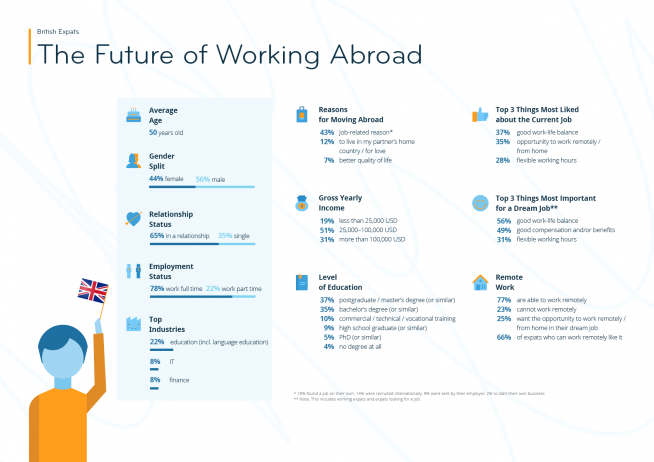A Good Work-Life Balance Is Everything to British Expats
Why do British nationals move abroad? According to the Expat Insider 2021 survey by InterNations, 43% of British expats working abroad relocated for their career. While this is the biggest share among the various reasons cited by British respondents, it is still slightly smaller than the global average (47%). Close to one in five (18%) found a job on their own, 14% were recruited internationally, and 9% were sent by their employer. Just 2% moved abroad to start their own business.
Aside from work-related reasons, an above-average share of British expats working abroad originally relocated for their partner’s job or education (6% vs. 4% globally), to live in their partner’s home country / for love (12% vs. 10% globally), or simply because they enjoy living abroad (5% vs. 3% globally). However, it is rather uncommon among British expats to move abroad to go to school or university (1% vs. 8% globally).
The Typical British Expat Working Abroad Is Older and Planning to Stay
British expats working abroad are on average 50 years old, which is much older than the global average (43.1 years). They are more likely to be men (56%) than women (44%), while another 1% of respondents from the UK prefer to self-describe their gender identity. Close to two-thirds (65%) are in a committed relationship (vs. 61% globally).
British expats working overseas are in it for the long run, with 33% having lived abroad for more than ten years, nine percentage points more than the global average (24%). More than two in five (42%) could see themselves staying abroad possibly forever, compared to just 30% of working expats worldwide.
British Expats Work in Education or as Freelancers
The majority of British expats (78%) works full time (vs. 82% globally). More than one in five (22%) work in the field of education, compared to 12% globally, which makes it by far the most common field of work among British expats. This might be related to English native speakers being much sought after: the share of Canadian (22%) and US American (25%) expats working in education is also considerably higher than the global average. Other common fields of work among British expats are IT and finance (8% each).
What is more, the share of British expats who are either self-employed / freelancers (18% vs. 11% globally) or running their own business (12% vs. 7% globally) is also bigger than the global average. Another 16% are top managers / executives (vs. 13% globally), while 24% work in a senior/specialist position (vs. 30% globally). Just 11% have a job in lower/middle management (vs. 17% globally).
Comparably Low Level of Formal Education — But High Incomes
The level of formal education among British nationals working abroad is lower than the global average: 4% have no degree at all (vs. 1% globally), and another 9% cite the equivalent to a high school degree as their highest academic qualification (vs. 5% globally). While 35% of British expats working abroad hold a bachelor’s degree (vs. 33% globally), the shares of those with a postgraduate/master’s degree (37% vs. 47% globally) or a PhD (5% vs. 8% globally) are again below the global average.
This does not seem to affect their income, though: more than three in ten British expats (31%) have a gross yearly income of at least 100,000 USD, compared to 23% globally. Another 31% make between 50,000 and 100,000 USD per year (vs. 33% globally), and just 38% have an income of up to 50,000 USD (vs. 44% globally).
A Good Work-Life Balance, but Missing Career Opportunities
Exactly three in four British expats (75%) are satisfied with their job in general (vs. 73% globally). They are particularly happy with their work-life balance (72% vs. 68% globally) and their working hours (73% vs. 70% globally). In fact, the average working week among the British respondents (37.9 hours) is two hours shorter than the global average (39.9 hours).
However, just 61% of British expats rate the state of the local economy in their current country of residence positively (vs. 65% globally). And fewer than two in five (37%) are happy with the local career opportunities, which is twelve percentage points below the global average (49%).
This might be related to the most common destinations that British expats move to: Germany, Spain, the Netherlands, Switzerland, and the USA. Only the USA (2nd) and Germany (8th) rank ahead of the UK (10th) when expats evaluate their local career opportunities in the Expat Insider 2021 survey. The Netherlands (17th), Switzerland (25th), and Spain (44th) follow further down in the ranking. For example, 60% of expats working in the UK are happy with their career opportunities, compared to 69% in the USA and 36% in Spain.
British Expats Enjoy Their Work-Life Balance Now …
When asked what they like best about their current job, 37% of British expats mention the good work-life balance, which makes this the most frequently cited aspect. It is followed by the opportunity to work remotely / from home (35%) and flexible working hours (28%).
More than three-quarters of British expats (77%) are able to work remotely (vs. 78% globally), and 66% of those who can work remotely actually like doing so (vs. 65% globally). More than two in five (42%) even work fully remotely (vs. 39% globally), and 19% work remotely for more than 15 days per month (vs. 18% globally). When they imagine their dream job, the opportunity to work remotely / from home is important for 25% of British expats. This is slightly above the global average (22%), but still far from the most frequently cited factor.
… and Consider It Highly Relevant for Their Future Career
So, what do British expats find important in their ideal work environment? The most frequently mentioned aspect is a good work-life balance (56%), followed by a good compensation and/or good benefits (49%). Globally, it is the other way around since expats worldwide consider a good compensation and/or good benefits (54%) more important than a good work-life balance (49%). More than three in ten British expats (31% each) also mention flexible working hours and creative/interesting tasks to be relevant for their dream job and future career.
“A good work-life balance is most important to British expats now and will remain relevant in the future,” says Malte Zeeck, InterNations Founder and Co-CEO. “Interestingly, other aspects that are closely related to a modern way of working, such as room for personal development, general career development, and the employer’s corporate culture, are not that important to British expats describing their ideal work environment. This is quite interesting since they come from a business culture where such values do seem to play an important role.”
In fact, just 19% of British expats consider room for personal development/growth important when imagining their dream job (vs. 22% globally). The shares are also below average for general career development (14% vs. 20% globally) and the employer’s corporate culture/values (12% vs. 15% globally).
The Concept of New Work Is More Common in the UK than Abroad
As British expats do not rate the above-mentioned aspects highly, they might not mind that they do not (yet) play a big role in their most common destinations. In fact, only 35% of British expats say that factors like autonomy, freedom, creativity, personal development, and self-fulfillment are more important in the business culture of their current country of residence than at home in the UK. These values are closely related to the concept of New Work, which describes the new way of working in the global and digital age. On a global scale, 49% of expats say the same about their host country.
The UK ranks 15th out of 55 countries when it comes to expats comparing the importance of New Work in the local business culture. Among the most common destinations where British expats work, the USA (1st) and the Netherlands (5th) rank ahead, while Switzerland (23rd) and Germany (35th) fall behind. Spain (48th) even lands among the ten destinations worldwide where New Work is least important in the local business culture. For example, 66% of expats working in the UK agree that New Work is important there, compared to 74% in the USA and 49% in Spain.




